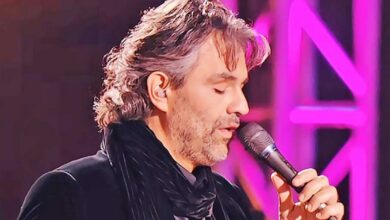Eddy Arnold And LeAnn Rimes Delivered A Remarkable Yodeling Showdown In Their “Cattle Call” Performance
“Cattle Call” holds a distinguished place within the tapestry of country music history, having been crafted during a time when the genre was undergoing significant transformation. Eddy Arnold, born on May 15, 1918, in southeastern Kentucky, emerged as one of the premier vocalists of his time. His unique ability to weave various musical influences into his work rendered him a beloved figure in country music. Arnold’s early career began in the late 1930s, when he gained attention on the Grand Ole Opry, showcasing a style that blended traditional country music with the smooth vocal techniques typically found in pop and rhythm and blues.
The roots of “Cattle Call” trace back to the early 20th century, during which cattle herding and cowboy culture were romanticized in American music. This song encapsulates that nostalgia, setting the tone for a broader appreciation of the pastoral lifestyle celebrated in country music. The lyrics of “Cattle Call” evoke the sounds and scenes of the open range, where cowboys and cattle coexisted in a harmony that resonated with the American public’s fascination with the West. Arnold’s combination of storytelling and melodic yodeling created an immersive listening experience that transported audiences to the sun-soaked plains and rolling hills of rural America.
Arnold’s influence did not stop with “Cattle Call.” Throughout his career, he recorded over 100 songs that charted on the Billboard lists, with a string of 28 number-one hits that showcase his ability to cross genres while staying true to his country roots. His smooth and polished sound, often characterized by rich arrangements and heartfelt lyrics, garnered him the title of the “Tennessee Plowboy” and an enduring legacy in the music industry. Arnold’s innovative approach allowed him to appeal to both traditional country fans and a wider audience, paving the way for future artists to explore similar musical territory.
As “Cattle Call” continued to resonate with listeners over the decades, its cultural significance grew beyond just a hit song. It became emblematic of the Western genre in music, often associated with the wild spirit of the cowboy and the romanticism of the open range. This song’s legacy also contributed to the rise of the Western swing era, which blended elements of country, jazz, and big band music, allowing artists like Arnold to explore new musical territories and attract diverse audiences.
In the years following Arnold’s success, many artists took on “Cattle Call,” interpreting it through their own unique lenses. Elvis Presley’s 1969 version, for instance, introduced a rock ‘n’ roll flair to the classic, while maintaining its foundational elements. This cross-genre appeal played a crucial role in revitalizing interest in earlier country classics among younger generations, demonstrating the song’s versatility and adaptability across changing musical landscapes.
The structure of “Cattle Call” itself is noteworthy as it effectively captures the essence of a live performance, where the call-and-response quality of the yodeling engages the audience and creates a communal atmosphere. Musicians often incorporate improvisational elements during live shows, allowing “Cattle Call” to evolve as an ongoing tradition of musical storytelling. The character and dynamics of live performances preserve the spirit of Arnold’s original work, keeping the cowboy narrative alive for new audiences.
As contemporary country music continues to draw from its rich historical roots, “Cattle Call” endures as a beacon of classic styling and storytelling within the genre. Artists today often revisit traditional themes, acknowledging the groundwork laid by pioneers like Eddy Arnold. The legacy of “Cattle Call” showcases not only Arnold’s immense talent but also the power of music to reflect and reinforce cultural identity and heritage.
The timeless nature of “Cattle Call” underscores the importance of preserving musical history, as it functions as a bridge connecting past and present. It serves as a reminder of American tradition and the values associated with the cowboy way of life—resilience, independence, and a deep connection to the land. The song continues to resonate in programs dedicated to preserving country music heritage, ensuring that newer generations of artists and fans appreciate the craftsmanship and emotion embedded in classic songs.
In summary, “Cattle Call” remains a quintessential example of how country music can evoke a deep sense of place and identity, thanks to the artistry of Eddy Arnold and later interpreters. The song’s legacy thrives in its consistent presence in popular culture, live performances, and its thematic explorations of cowboy life, demonstrating that the allure of the American West continues to inspire and connect with audiences. Arnold’s impact on country music as a whole is profound, and “Cattle Call” serves as a testament to the timelessness of his artistry, echoing through the decades with an enduring resonance that captivates all who hear it.





